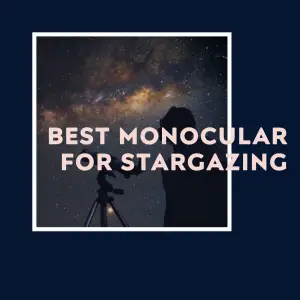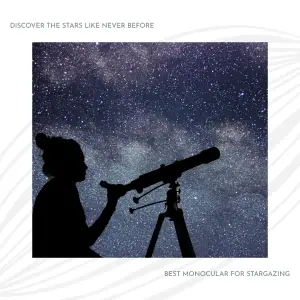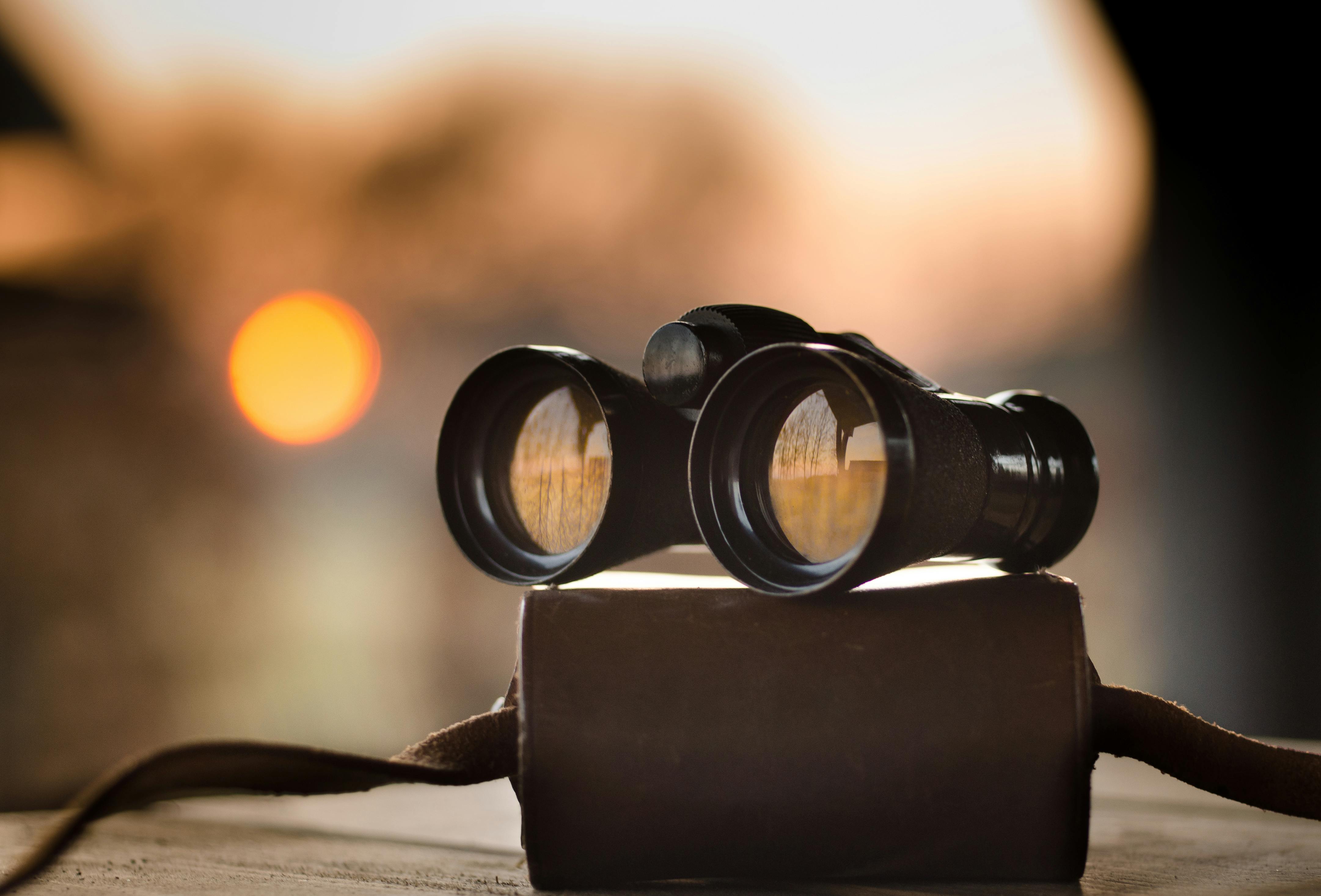Searching for the best monocular for stargazing?
Look no further, fellow cosmic wanderers! We’ve scoured the galaxies, dodged a few shooting stars, and brewed countless cups of celestial coffee to bring you the finest stargazing companions.
Brace yourself for an astronomical adventure – we’ve got the telescopic scoop!
Discover the best monocular for stargazing and elevate your celestial escapades.
Ready to embark on a stellar journey? Let’s lift off!
Discover Your FREE Personalized Moon Reading Now
The Cosmic Quest: Unveiling the Best Monocular for Stargazing
Exploring the Universe through a Single Lens
If you’ve ever gazed up at the night sky, captivated by the twinkling stars and mysterious cosmic wonders, you’re not alone.
Stargazing is a timeless human endeavor that ignites our sense of wonder and curiosity about the vastness of the universe.
Whether you’re an astronomy enthusiast, a seasoned stargazer, or a curious beginner, having the best monocular for stargazing can take your celestial adventures to astronomical heights!
Discover Your FREE Personalized Moon Reading NowThe Monocular Marvels: Why Choose a Monocular for Stargazing?
Before we dive into our cosmic odyssey, let’s address the burning question: Why pick a monocular over a traditional telescope?
Well, think of it as trading in a multi-passenger spaceship for a sleek solo cruiser. Monoculars are compact, lightweight, and easy to use, making them ideal for stargazing on the go.
Whether you’re hiking to a remote dark-sky site or simply stargazing from your backyard, a monocular offers unparalleled portability and convenience.
The Stars Align: Key Features to Consider
Selecting the perfect monocular for stargazing is no rocket science, but it does require a keen eye for celestial details. Here are some crucial features to keep in mind:
1. Aperture: Gateway to Celestial Clarity
The aperture, the diameter of the monocular’s objective lens, is your cosmic gateway to clear and detailed views.
Discover Your FREE Personalized Moon Reading NowBigger apertures gather more light, allowing you to spot faint celestial objects like distant galaxies and nebulae.
For the best stargazing experience, aim for an aperture that mirrors the twinkling night sky – go big!
2. Magnification: Zooming into the Cosmos
While high magnification may seem tempting, it’s not always better for stargazing.
The Earth’s atmosphere can distort images at extreme magnifications, leading to a blurry view.
For stargazing, a moderate magnification of 8x to 10x strikes the perfect balance between zooming in on celestial wonders and maintaining a steady image.
Discover Your FREE Personalized Moon Reading Now3. Lens Coatings: Unveiling the Stellar Secrets
Ever wondered how astronomers get those crystal-clear images of celestial objects?
Lens coatings are the secret sauce!
Anti-reflective coatings on the lenses minimize light loss and improve contrast, allowing you to see stars shine brighter than ever before.
Look for fully multi-coated or fully multi-coated lenses for celestial clarity that’s out of this world!
The Cosmic Contenders: Top Picks for Stargazing Monoculars
Now that we’ve covered the celestial ABCs of monoculars, it’s time to unveil our cosmic contenders for the title of the best monocular for stargazing.
Discover Your FREE Personalized Moon Reading NowThese stellar companions are poised to elevate your stargazing escapades to infinity and beyond!
1. Celestial Cruiser 9000
Behold the Celestial Cruiser 9000, the monocular that will take you on an astronomical joyride!
With its generous 80mm aperture and fully multi-coated lenses, this celestial chariot gathers an impressive amount of light, revealing distant galaxies in stunning detail.
Its 10x magnification ensures you’ll feel like you’re soaring through space.
2. Starlight Seeker Pro
For the adventurous stargazers who roam the cosmos in search of celestial gems, the Starlight Seeker Pro is your trusty guide.
Discover Your FREE Personalized Moon Reading NowArmed with a 70mm aperture and a sleek design, this monocular is a portable powerhouse.
Its 8x magnification provides a wide field of view, perfect for observing star clusters and the majestic Milky Way.
3. Nebula Navigator 3000
Embark on a quest to explore the enigmatic nebulae with the Nebula Navigator 3000.
This compact and travel-friendly monocular features a 65mm aperture, making it an ideal companion for stargazing excursions.
Its 9x magnification unveils the intricate details of celestial clouds, letting you witness the birth of stars.
Discover Your FREE Personalized Moon Reading NowCelestial Adventures Await: Making Your Choice
As you embark on your cosmic adventure, keep in mind that the best monocular for stargazing is the one that aligns with your astronomical aspirations.
Whether you opt for the Celestial Cruiser 9000’s grandeur, the Starlight Seeker Pro’s versatility, or the Nebula Navigator 3000’s portability, the celestial wonders are waiting to be discovered.
So, fellow stargazers, prepare to lift off into the cosmos and let your monocular be your trusty spaceship on this mesmerizing journey of celestial exploration! Happy stargazing!
Related Article: Astrology for Women: Embrace Your Cosmic Power

The Night Sky Unveiled: Rediscovering the Joy of Stargazing
Remember the days when we used to lie on the grass, looking up at the night sky, and imagining the adventures that awaited among the stars?
Well, stargazing is not just for kids—it’s a timeless pursuit that can reignite our sense of awe and wonder.
With the best monocular for stargazing in hand, you can uncover the universe’s hidden treasures and rediscover the joy of exploring the cosmos.
The Twilight Chasers: Unraveling the Secrets of Dusk and Dawn
Stargazing isn’t confined to the deep of the night; some of the most magical moments happen during twilight.
As the sun kisses the horizon, and the stars begin to emerge, capturing these ethereal transitions can be a mesmerizing experience.
Discover Your FREE Personalized Moon Reading NowA monocular with exceptional low-light performance can be your ally in chasing the enchanting beauty of dusk and dawn.
Shooting Stars and Meteor Showers: Witnessing Celestial Spectacles
One of the most captivating events in the night sky is the spectacular dance of shooting stars and meteor showers.
These celestial spectacles can leave us in awe as we witness the remnants of cosmic travelers lighting up the atmosphere.
With a monocular by your side, you can catch shooting stars in action and make wishes upon the meteor shower’s radiance.
An Astronomer’s Arsenal: How Monoculars Complement Telescopes
While telescopes are astronomy’s heavy artillery, monoculars can serve as trusty sidekicks in an astronomer’s arsenal.
Discover Your FREE Personalized Moon Reading NowTheir versatility and ease of use make them perfect for scouting the night sky for potential celestial targets.
Whether you’re an amateur astronomer or a seasoned skywatcher, a monocular can be the perfect complement to your telescope setup.
The Cosmic Time Machine: Observing Celestial Events
As the night sky unfolds its cosmic events, a monocular can become your personal cosmic time machine.
From tracking the movement of planets to observing lunar phases, you can witness the ever-changing dance of celestial bodies.
With each observation, you’ll develop a deeper connection with the universe and marvel at its intricate clockwork.
Discover Your FREE Personalized Moon Reading NowBeyond the Sky: Terrestrial Adventures with a Monocular
Don’t stash away your monocular when the sun rises!
During the day, you can use it for terrestrial adventures too.
Whether you’re birdwatching, hiking, or exploring nature, a monocular can enhance your experience by bringing distant objects up close and adding a touch of wonder to your everyday explorations.
Related Article: Orbs in Astrology: The Cosmic Magnifiers
FAQs About the Best Monocular for Stargazing
How does a monocular differ from a telescope for stargazing?
A monocular is a single optical instrument with one eyepiece, while a telescope typically has two eyepieces for binocular viewing.
Discover Your FREE Personalized Moon Reading NowMonoculars are more portable and suitable for on-the-go stargazing, whereas telescopes offer higher magnification and light-gathering capabilities for more detailed observations.
What is the ideal aperture size for stargazing monoculars?
For stargazing, an aperture size of around 70mm to 80mm is ideal.
A larger aperture gathers more light, allowing you to see fainter celestial objects with greater clarity.
However, balance it with portability, as larger apertures can make the monocular bulkier.
Can I use a monocular to observe planets?
Yes, you can observe planets with a monocular, but keep in mind that its smaller aperture may limit the level of detail compared to telescopes.
Discover Your FREE Personalized Moon Reading NowStill, you can enjoy views of the Moon’s craters, Jupiter’s moons, and Saturn’s rings with a good-quality monocular.
How important are lens coatings in a stargazing monocular?
Lens coatings are crucial for stargazing monoculars as they reduce light loss and enhance image contrast.
Fully multi-coated lenses are the best, as they ensure maximum light transmission and minimize unwanted reflections, resulting in sharper and clearer views of celestial objects.
Can I use my smartphone with a stargazing monocular?
Yes, many monoculars come with smartphone adapters, allowing you to attach your smartphone to the eyepiece and capture celestial objects through the lens.
This opens up possibilities for astrophotography, letting you share your stargazing experiences with others.
Discover Your FREE Personalized Moon Reading NowHow do I choose the right magnification for stargazing?
The ideal magnification for stargazing is typically between 8x and 10x.
Higher magnifications may lead to a shaky view due to Earth’s atmospheric conditions.
A moderate magnification provides a good balance between getting closer views of celestial objects and maintaining image stability.
Final Thought About the Best Monocular for Stargazing
In the vast canvas of the night sky, a monocular becomes your trusty portal to a universe of wonders.
With the perfect balance of portability and power, it unveils the celestial treasures with remarkable clarity.
Discover Your FREE Personalized Moon Reading NowWhether you’re a seasoned stargazer or a curious novice, the best monocular for stargazing will be your faithful companion on this cosmic journey.
Embrace the magic of gazing at distant galaxies, tracing the constellations’ stories, and witnessing shooting stars dance across the heavens.
Let your monocular be the bridge that connects you to the mysteries of the universe, igniting your passion for exploration and discovery. Happy stargazing!
